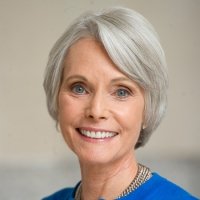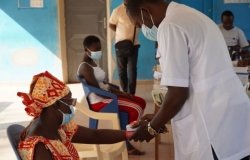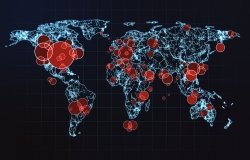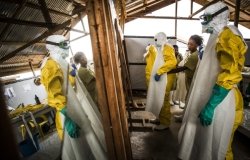Shutterstock
WEBCAST: Disinformation Amid the Coronavirus Pandemic
Overview
As the coronavirus has spread globally, so has disinformation and censorship by authoritarian governments. Both Russia and China have attempted to spread false information about the genesis of the virus and China has clamped down internally on information surrounding the pandemic, silencing both domestic reporters and whistleblowers. Yet even democracies are not immune: Brazilian President Jair Bolsonaro has been condemned by social media sites and members of his own government for spreading disinformation on social distancing measures recommended by public health authorities.
STIP Disinformation Fellow Nina Jankowicz, Kissinger Institute Associate Rui Zhong, and Brazil Institute Senior Associate Anya Prusa discussed disinformation surrounding the coronavirus and the U.S. response.
SUMMARY
In a panel chaired by Wilson Center Global Fellow and former Moscow Bureau Chief for CNN, Jill Dougherty, speakers Nina Jankowicz (Disinformation Fellow, Science and Technology Innovation Program), Rui Zhong (Program Associate, Kissinger Institute), and Anya Prusa (Senior Associate, Brazil Institute) discussed how disinformation is impacting Russia, China, and Brazil’s responses to the COVID-19 pandemic.
Nina Jankowicz underlined that the pandemic offers “fertile ground” for disinformation since populations around the world are falling prey to the same fears. Emotion, she stated, has been the mainstay of Russian disinformation campaigns over the last ten to fifteen years because this is what attracts people to their narrative. She also highlighted how Kremlin disinformation is aimed not just at the West, but also at the Russian population as President Vladimir Putin seeks to shore up his popularity during the crisis. Jankowicz advocated for “informational distancing” in order to push back against disinformation narratives. “If you are reading something that seems too good to be true,” she said, “Or you feel your emotions rising, you are probably being manipulated, and it’s time to put down that device and walk away.”
Rui Zhong stated that China is both a producer and a target of disinformation. She detailed how various state organs, including the Propaganda Bureau, have sought to co-opt narratives, as well as create their own, such as in the case of whistle-blower doctor Li Wenliang. Zhong also highlighted how western media and politicians, particularly in the United States, have spread disinformation that plays into xenophobic anti-Chinese narratives. Regarding the U.S. – China dynamic, she stated that Presidents Xi Jinping and Donald Trump represent “two administrations where hawks are at the wheel” and where scoring political points takes precedence over transparent and cooperative information sharing. On the claim that authoritarian regimes have responded better to the pandemic than democratic ones, Zhong stressed that responses should be seen more as a result of individual states’ priorities rather than as attributions of a regime type.
Anya Prusa concluded by outlining the tensions between Brazil’s President Jair Bolsonaro and the other branches of power. Bolsonaro, she said, is a key purveyor of disinformation, actively rejecting social distancing and criticizing the media for supposedly exaggerating the virus’s seriousness. She highlighted how Brazil is “saturated in social media,” and is Facebook’s fourth largest market, and therefore a fertile breeding ground for disinformation. Prusa emphasized the broad effort to contain the disinformation spread by the Brazilian president, noting the work of fact-checking organizations run by journalists, but also measures implemented by the Congress and judicial branch. She suggested that Bolsonaro’s response might, in part, be due to his campaign promise to boost Brazil’s economy – a plan that would be jeopardized by closing businesses to counter the virus.
Selected Quotes
Nina Jankowicz
“I think what is unique about the COVID-19 crisis is that it is literally affecting everyone around the world and that everyone is feeding on the same fears for their own health, for loved one’s health, and there’s this lack of information because of the novelty of this virus. And that is why it’s such a fertile ground for disinformers of all stripes. Not only foreign disinformation but also domestic disinformation. This is fertile ground for everyone.”
“I’ve been advocating for something that I call ‘informational distancing.’ Just like we have social distancing with regard to keeping the virus at bay, we need some informational distancing in order to push back against these narratives of disinformation that have been proliferating over the past couple weeks.”
Rui Zhong
“China is very unique as a disinformation case because it is both a producer of disinformation but also it’s a target of disinformation as the first country that was hit by the COVID-19 outbreak. And I think that both of these roles as the producer of disinformation and as a target of disinformation have effectively slowed down the flow of information.”
“Early on you had a lot of photos or information that spread virally, including one photo of a woman that was eating some kind of dish in Southeast Asia that was made out of bats. This, plus the information that the disease sprung out of a seafood market eventually went viral, fanned xenophobia in the United States and Europe.”
Anya Prusa
“The president of Brazil is playing an active role in generating and sharing disinformation about public health recommendations at this moment. He’s emerged over the course of the last month as one of the most well-known skeptics… He’s downplayed the seriousness of the disease calling it ‘a little cold’ and ‘hysteria.’ He’s blamed the press for overstating the seriousness of this health crisis and he’s been actively discouraging social distancing and other non-pharmaceutical interventions, undermining in fact his own health ministers’ recommendations.”
“What Brazilians are seeing is not a unified government message. They’re seeing confusing messages, they’re seeing conflict, and that’s not reassuring for people who want to look towards their government as a source of advice and a source of response of action to combat the spread of coronavirus."
Speakers
Hosted By

Kennan Institute
The Kennan Institute is the premier US center for advanced research on Russia and Eurasia and the oldest and largest regional program at the Woodrow Wilson International Center for Scholars. The Kennan Institute is committed to improving American understanding of Russia, Ukraine, Central Asia, the Caucasus, and the surrounding region though research and exchange. Read more

Kissinger Institute on China and the United States
The Kissinger Institute works to ensure that China policy serves American long-term interests and is founded in understanding of historical and cultural factors in bilateral relations and in accurate assessment of the aspirations of China’s government and people. Read more

Brazil Institute
The Brazil Institute—the only country-specific policy institution focused on Brazil in Washington—works to foster understanding of Brazil’s complex reality and to support more consequential relations between Brazilian and US institutions in all sectors. The Brazil Institute plays this role by producing independent research and programs that bridge the gap between scholarship and policy, and by serving as a crossroads for leading policymakers, scholars and private sector representatives who are committed to addressing Brazil’s challenges and opportunities. Read more

Science and Technology Innovation Program
The Science and Technology Innovation Program (STIP) serves as the bridge between technologists, policymakers, industry, and global stakeholders. Read more
Thank you for your interest in this event. Please send any feedback or questions to our Events staff.














